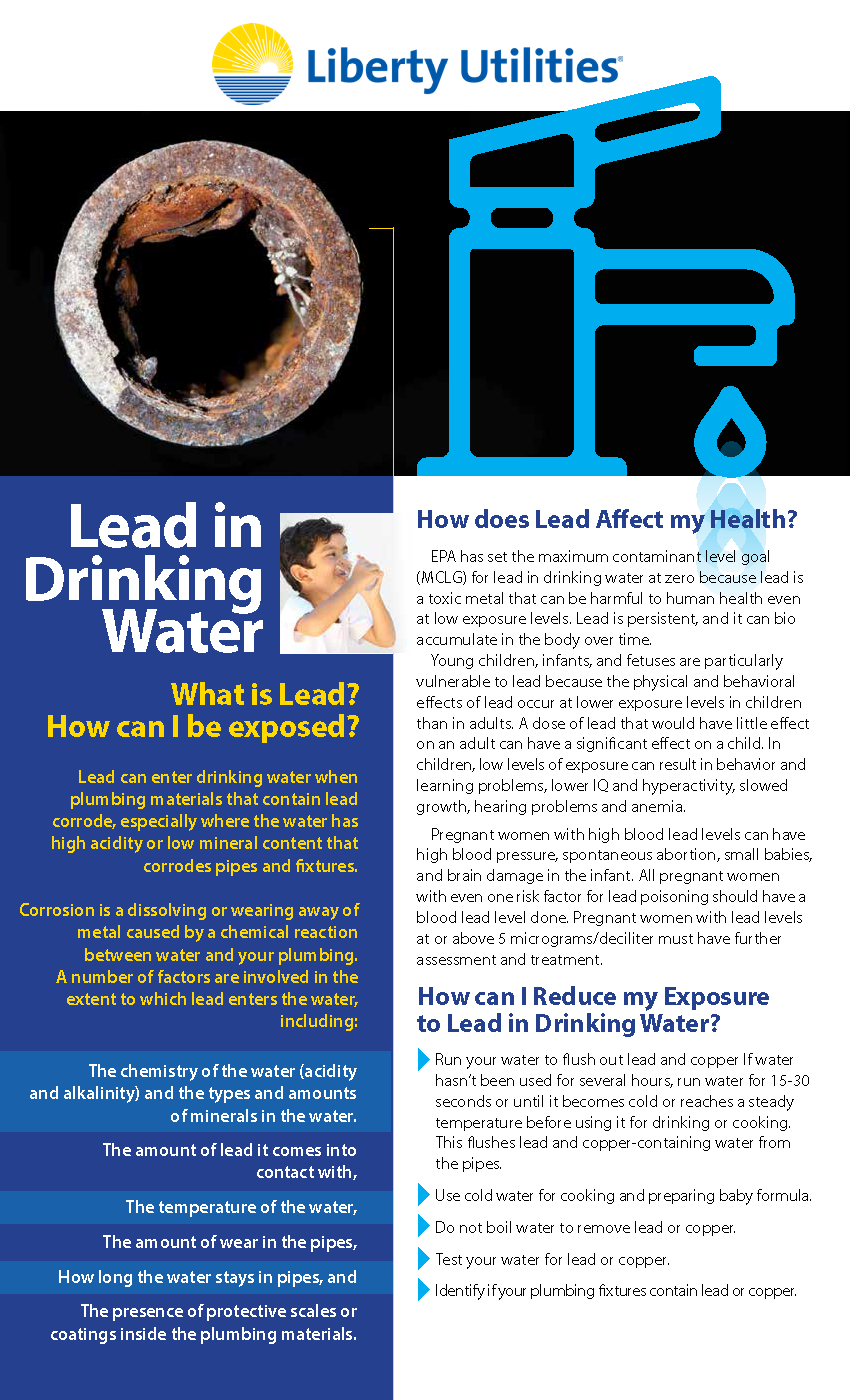Water is one of the most important natural resources we have and Liberty has the privilege of being a steward of this precious commodity, but in some ways it can also be dangerous. Natural and manmade hazards involving water are a part of life, which Liberty strives to mitigate.
Proper Disposal of Chemicals, Medications and Disposables
Chemicals and medications are difficult and costly to remove during the wastewater treatment process. Some of them cannot be removed and end up back in streams and groundwater. It is important to properly dispose of the items below.
Medications:
Unused medications shouldn’t be kept where they might be abused, but flushing them down the drain is not a good option. By flushing them, they dissolve and become very hard to remove from the water, introducing the chemicals back into the environment. They also have the potential to create drug-resistant viruses and bacteria. The FDA recommends crushing unused medications up with small-grained waste and throwing it in the trash.
Household chemicals:
Like medications, these chemicals are very hard to remove during the wastewater treatment process. Many also have the potential to corrode your pipes. Check the instructions on the back of the container to find out how to best dispose of chemicals. Also check with your local county for hazardous chemical collection dates.
Bathroom Wipes:
Bathroom wipes — those thick, moist towelettes — are advertised as flushable and can, in fact, be flushed down the toilet. Once in the sewer system, however, studies have found they don’t break down. Instead they contribute to clogs in the pipes and pumps, requiring costly repairs. Other clogging culprits include baby wipes, paper towels, make-up removing towels, disinfecting wipes, and feminine products. These should all be disposed of in the trash. Learn More
Water is fun, but can be dangerous. It’s important to follow water safety practices while around water. That includes in the house or while enjoying a pool, lake, river or stream. Here are some good practices for water safety:
For more information on children and water safety, contact your local county.

Planting a tree? Installing a fence? Planning a home improvement? Call 811.
Did you know it’s the law to make this call? Electric power lines, natural gas pipelines, water pipes, communications lines, and other utility services can be within a few feet of the ground ’s surface. Not knowing where they are can result in personal injury, property damage, and neighborhood service interruptions. Even a small dent or a scrape can cause damage, resulting in a leak or service-wide disruptions.
Floods are the most common natural disaster in the United States. While flooding can cause significant property damage, flash floods form quickly and can become very dangerous and even life-threatening. A flash flood is the rapid flooding of low-lying areas such as washes, rivers and streams.
Flash floods can occur when there is heavy rain upstream or large amounts of meltwater from snow and ice in high regions. It is important to have a basic knowledge of flash flooding.
Be smart and stay aware of the times of the year most likely to produce flash flooding. For more information on flash floods and other safety hazards check with your local counties.
Have you seen purple colored water pipes in your neighborhoods and parks? Ever wonder what they are? When pipes are painted purple, it means that the water used for the feature or landscaping is actually reclaimed water, instead of potable (or drinking) water.
Reclaimed water is not for drinking, although it is clear, odorless and safe for other purposes, like irrigation and water features.
What is reclaimed water?
Reclaimed water is what comes from our wastewater treatment plant after the cleaning process. Our plant uses technologies to treat and process water faster than even nature can. By using reclaimed water, communities can conserve traditional freshwater supplies for drinking and provide an environmentally responsible alternative to disposal of wastewater.
To assure safety for other uses, reclaimed water that is used in areas where people may come in contact with it, such as for golf courses and landscape irrigation, it must meet drinking water standards for pathogens. However, it usually contains impurities that keep it from meeting other drinking water standards.
FOG stands for FATS, OILS, and GREASE. They hide in many places like baked goods and pastries, lard, butter, cream-based sauces, dairy, and gravy. Oils are fat in its liquid form, found in vegetable oils, margarine, and salad dressing. This also includes motor oil. Greases are made of meat drippings, greasy foods, etc.
Why is F.O.G. bad?
When fats, oils and greases enter the wastewater or septic system, they cool, solidify and stick onto the sides of the pipe. Over time, more layers build until the line is completely blocked, causing backup which can lead to clogged drains and toilets, raw sewage backing up into your home and environment, expensive clean up, repairs and replacements, unpleasant odors and potential public health risks.
What should you do?
Fire fighters or police officers are often the first to arrive at a public safety emergency. These first responders are most likely to encounter the potential hazards of isolated flood hazards, road collapse or sewage spills. In an effort to help prepare first responders for situations they may encounter, Liberty Utilities meets and provides local responders with valuable information annually.